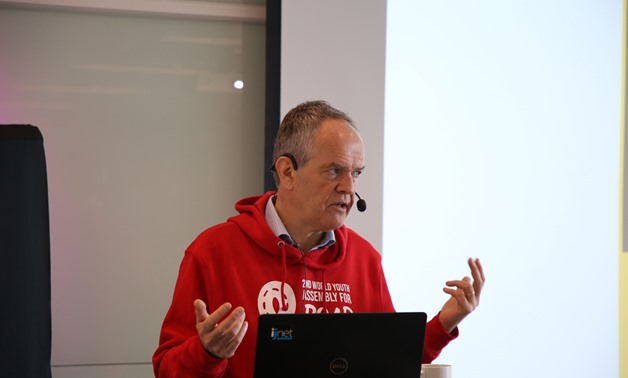
Etienne Krug is Director of the World Health Organization’s (WHO) Department for Management of Non-communicable Diseases, Disability, Violence and Injury Prevention - Photo by Nourhan Magdi/Egypt Today
Stockholm – 18 February 2020: As the price people around the world pay for mobility gets higher, with 1.35 million deaths are recorded annually, WHO expert hopes similar attention paid to coronavirus would be dedicated to improving road safety status worldwide.
“The leading cause of death is road accidents, we cannot accept that, we have to do more, and people have to demand that transportation become much safer,” said Etienne Krug is Director of the World Health Organization’s (WHO) Department for Management of Non-communicable Diseases, Disability, Violence and Injury Prevention in an interview with Egypt Today magazine.

Etienne Krug is Director of the World Health Organization’s (WHO) Department for Management of Non-communicable Diseases, Disability, Violence and Injury Prevention - Photo by Nourhan Magdi/Egypt Today
Ministers and representatives from more than 140 countries are gathering in Stockholm for the 3rd Global Ministerial Conference on Road safety set to kick off on Wednesday. Several sidelines sessions will be there, where countries share progress in road safety, and set a future plan for reducing traffic deaths worldwide.
Krug ruled out that coronavirus, which has been dominating news and international discussions would affect the organization’s attention to the first leading cause of the death, which are road accidents. A total of 1,868 deaths from coronavirus were recorded in mainland China reached, with 72,436 infections confirmed.
 Etienne Krug is Director of the World Health Organization’s (WHO) Department for Management of Non-communicable Diseases, Disability, Violence and Injury Prevention - Photo by Nourhan Magdi/Egypt Today
Etienne Krug is Director of the World Health Organization’s (WHO) Department for Management of Non-communicable Diseases, Disability, Violence and Injury Prevention - Photo by Nourhan Magdi/Egypt Today
Krug further explained that the attention paid by governments to coronavirus is a demonstration that governments can move towards an issue when they have the will.
Regarding the Decade of Action program set by the UN from 2011 to 2020, Krug said that the goals to halve the number of deaths were not achieved, and that countries still need to do more.
“There is a lot that can be done to improve road safety, we have to work on infrastructure, vehicles and people’s behavior. Good legislation on speeding, drinking and driving, using seat belts or motorcycle helmets is extremely important, and it has to be enforced and people should be informed,” he added.
Krug believes that people’s behavior can be changed, and that the matter is a question of good laws, and enforcement.
As many countries, including Egypt, are encouraging citizens to shift to biking rather than vehicles, Krug said that “bicycling is a very health, cheap and clean mean of transportation, but it has to be safe and requires bicycle lanes separated from the rest of the traffic.
“Zero deaths on the roads should be every country’s objective, we are paying way too higher price for our mobility. Zero deaths is in reach in countries like Sweden and Norway, while in other countries it is further away, but still, it should be the ambition,” he said.

Comments
Leave a Comment